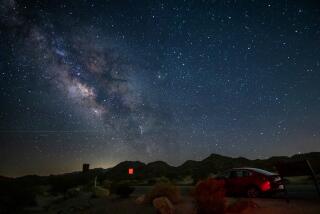After Sunset, Rules of War Change Drastically : Nature: GIs discover that nighttime poses hazards that can cripple even the best-equipped of troops.
- Share via
WITH U.S. FORCES, Saudi Arabia — In 24 hours in the field governed mostly by nature, there is light and then there is almost total blackness.
By day, the sprawl of military across acres of sand can sometimes seem all within reach. But in what now resembles homesteads in an uncharted frontier, a plunge into night means baffling disorientation.
Camps only next door fade to nothingness as dusk deepens, and soon even adjacent tents become invisible. With rules strictly enforced to ban even a cigarette ember, the desert at night is a void.
Overhead, warplanes and helicopters equipped for after-dark vision still roar by unmolested. The clanking of armor and dull thud of artillery also betray an Army preparing to fight without light.
But for mortals unequipped with such aids, the setting sun begins a 12-hour approximation of blindness. Vehicles scurry toward still-recognizable shapes, fearful of being caught out in the night. And by the time the blackness completely takes hold, navigation becomes a matter of feeling one’s way through the dark.
So important is light to U.S. commanders that they are briefed daily on the slightest of changes.
With Iraqi troops having only scant night-vision capability, it is now that American officers believe the enemy is most vulnerable. And after a month of camp life just south of the border with the 1st Armored Division, the extent to which nighttime can cripple has become evident.
For one veteran officer here, a 20-mile jaunt just after dark turned into a bone-jarring seven-hour ordeal as a carload of soldiers tried in vain to find camp.
Even when armed with a navigation device that brought him within a few hundred meters of home, the major only finally tracked down his still-invisible headquarters when he heard the sound of gas-powered generators.
Countless others have found themselves in similar straits, jolting cross-country for hours on end in hopes of running into something familiar. Dirt tracks that provide a rough guide to direction in daylight offer little help after dark.
These aimless nightlong forays became so frequent that one brigade commander imposed a stern ultimatum. After two hours, he ordered, those who could not find their way home must pull into the nearest camp--or sleep where they are in the sand.
The pitch-blackness of night is a product in part of a war zone far-removed from centers of population. Deep in the desert, under a vast Milky Way, civilization might well be a planet away.
But since tens of thousands of soldiers who now pack the desert seem to disappear after 6 p.m., the near-total darkness is a tribute as well to the success of a mandatory blackout.
Hot meals may be served morning or noon, but night is the time for cold rations. Those vehicles trying to make their way home after dark must do so without even dashboard illumination. Red filters, once accepted as covers for flashlights, now are uniformly discouraged.
Even in camp, when one ventures outside a tent and zips the flap shut behind, the all-encompassing night can bring an almost dizzying feeling of weightlessness.
With so few nighttime distractions, some soldiers say, it is little wonder that sunset tends to mean bedtime. “People pile in their beds as soon as the sun goes down, and they’re already crashing out,” complained Specialist Phillip Knopp, a 22-year-old from Austin, Tex., who serves in the 66th Armored Regiment.
“I say, ‘Hold up a minute, guys,’ ” Knopp continued. “After all, it’s only 6:30.”
To be sure, the blackness is not always complete. Under operations tents, electric bulbs burn through the night; across the sand, illegal headlights periodically glare. But more often than not, when the darkness is pierced, it is with stark reminders of war.
The other night, the sky came alight for an hour or more with the test-firing of a rocket artillery battery. Again and again, the missiles flared at launch and then burned bright in a graceful, almost hypnotic arc.
Another night, yet another lost Army officer, Capt. Mike Wilbur, navigating only with compass in a jeep, stopped in a burst of temper in mid-desert to wait for the moon to rise.
He had lit up a cigarette and sat back to listen to the Righteous Brothers when suddenly the sky was aflame.
“It was the Fourth of July to music,” Wilbur said of the artillery show, pyrotechnics against a jet-black backdrop--and accompanied by warplanes streaking home from Iraq. “All I needed was a beer.”
This story was reviewed by military censors.
More to Read
Sign up for Essential California
The most important California stories and recommendations in your inbox every morning.
You may occasionally receive promotional content from the Los Angeles Times.








